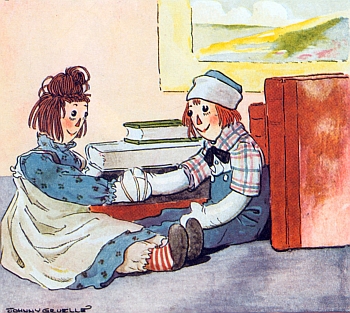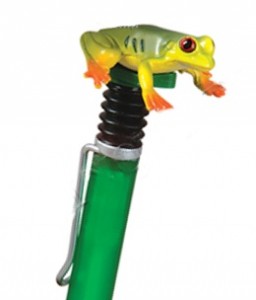
- Finally! Today’s Boston Globe covers the thrift-store calamity:
In recent weeks, Goodwill pulled all children’s merchandise from its nine stores in the state. Thrift chain Second Time Around eliminated kids’ clothing from several of its 16 shops. St Vincent de Paul is currently removing children’s clothing with metal zippers, buttons, and painted fabrics from its processing center, which sends out merchandise to its six stores in Massachusetts.
It’s exactly the sort of coverage that’s been overdue in the biggest newspapers since Feb. 10: well-reported, making clear the human costs of the law for both cash-strapped shoppers and charitable sponsors, and including words like “devastating” and “heartbreaking”. And on page one.
- If you missed it yesterday, Overlawyered gets results! Although sometimes the opposite of the kind we intend. Yesterday we hailed as a breakthrough the House Small Business Committee’s willingness to hold a hearing next week on the costs of CPSIA. Within a few hours, as Rick Woldenberg relates, Congressional staffers hastily put out word that they were canceling the hearing and that the idea is “not likely to ever be brought back”. There’s no way for us to know just who placed the phone call, but odds are good it was someone who realized that letting people from around the country get in front of a microphone and talk about this law’s effects would not exactly do wonders for the image of Henry Waxman, Bobby Rush, Jan Schakowsky, Public Citizen, PIRG, or their allies. More on the cancellation from Rick Woldenberg, who reports that this is the third time he’s been disinvited from Capitol Hill testimony. Sounds like someone really dislikes the message he would deliver.
- Hair bow makers on the verge of a nervous breakdown.
- The Examiner, which has a wide readership in Washington, D.C., San Francisco, and other cities, is out today with a great editorial on CPSIA which also generously directs readers to this site and its “chilling” reports. It concludes: “This law is an utter disaster. Congress ought to fix it, immediately.” The Examiner also quotes Sen. Mark Pryor (D-Ark.), one of the law’s sponsors, as saying “the law allows the CPSC to make ‘commonsense exceptions’ to anti-lead requirements.” This is not the first time I have been obliged to wonder whether Sen. Pryor actually has a close familiarity with the terms of the bill he helped guide to passage, and if not, whose summaries he has been relying on when he talks to the press.

It is precisely because the law does not confer on the CPSC any “commonsense exception” authority that the commission was obliged to turn down the makers of kids’ minibikes in their plea for an exemption the other day. Same for many other instances that could be cited, such as the pre-1985 books and the size 10 winter coats with zippers and snaps that are being yanked from thrift store shelves. Had the commission such a “commonsense exception” discretion, it would almost certainly have acted by now to defuse these sources of public outcry. To repeat the question: who does Sen. Pryor rely on for his briefings? - Speaking of products with vanishingly low risk of poisoning that have trouble obtaining commonsense exemptions, we’ve been remiss in not staying on the case of ballpoint pens, mentioned in our Feb. 6 and Feb. 13 roundups. Deputy Headmistress has quite a bit more on the legal limbo occupied by the writing implements, which appear now to be unlawful when intended primarily for under-12 use. And visitor “Scott” wrote last week in our comments section:
What still amazes me is that the story about ballpoint pens being in violation of the CPSIA isn’t getting more notice. The CPSC admits that ballpoint pens intended for children are covered. As it happens, the US trade association for the makers of pens, pencils and erasers has sent a letter to the CPSC that ballpoint pens are not-compliant and no existing alloy satisfies the lead limits. It may take 2 years to develop an alloy, if one exists. I can only conclude that there must be very very very many stores not in compliance and ‘poisoning’ our children with lead. Are these stores not facing strict liability and risking felony criminal liability including 5 years in prison and $250,000 fines? The stay by the CPSC doesn’t help the pen-makers or sellers, because they’re in knowing violation of the lead limits. All they can hope for is that none of the 50 state attorney generals decides to prosecute what would appear to be a slam-dunk case. There is a chance that the CPSC may eventually decide to make an exemption for pens, however the CPSC admits that its staff is ‘not yet aware of any substance as to which the required showing [of no absorption of any lead into the human body] can be made.’.



8 Comments
Since the Boston Globe, which featured the problems that CPSIA is causing for thrift shops and thrift shop patrons, on its front page today, is owned by the New York Times, maybe now the New York Times will finally get the message about the many problems that CPSIA is causing and print its own article(s) on it.
[…] on it here. And the single best place to track all its devastation is at Walter Olson’s Overlawyered. Bookstore owners are literally destroying old children’s books while thrift shops go out of […]
Thank for your outstanding investigative reporting, something totally lacking in the “mainstream” dead tree press.
Small wonder the newspapers are dying.
Nothing to add, except “Kudos” for the reporting you are doing!
(And of course, it’s nice to have someone of your standing being one of those old ignorant “Mommy Bloggers”–Sarcastic Snorting!)
[…] They’d heard through a listener about the kids’ motorbike ban, and we also discussed ballpoint pens and pre-1985 kids’ books, as well as the question of whether anyone in Congress reads the […]
[…] coverage of the law’s appalling effects in such areas as thrift stores, youth motorcycles, ballpoint pens, and (so far with many of the worst effects postponed) toys, apparel, and […]
[…] such as Amy Klobuchar, Jay Rockefeller, and Mark Pryor claim that the CPSIA allows the Consumer Product Safety Commission (CPSC) to make […]
[…] — the handicrafters’ livelihoods blasted, the families unable to find sturdy winter clothes at the Goodwill, the kids who can’t get their dirtbikes serviced, the threats to vintage children’s […]